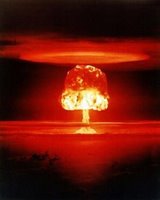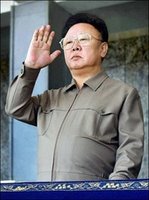DROPPING THE M
When madness needs an acronym, you can be sure military planners will give it one. In the 1950’s the acronym they gave to the massive nuclear buildup between Russia and the west was MAD for “mutually assured destruction.” Under this concept, the thousands of nuclear-tipped warheads hidden in silos, submarines, and jet hangers had a purpose: by adding more and more kilo-tonnage until the world could be destroyed a hundred times over, the ‘assured’ part was in place as total destruction was inevitable. The mutual part was self-evident. This arms race went on unabated for decades and it was generally understood that a nuclear exchange between countries would and could destroy not only the enemy country but also possibly the ability of the planet to support life.
Our culture was fixated on this end to civilization as popularized in books including Nevil Shute’s 1957 On the Beach and TV movies like The Day After. We understood the idea that we could bring on our own asteroid-striking-the-earth-and-destroying-civilization as we know it cataclysm. There would be total darkness and unimaginable terror and horror. The temporary survivors who would die slowly in a radiation-saturated atmosphere would envy the dead. Russell Hoban graphically described this in a 1980 novel Riddley Walker.
Additionally, since we have images of this potential horror in the form of documentary footage from Hiroshima and Nagasaki, and since we know these WWII bombs were mere firecrackers compared to their newer Plutonium offspring, we can imagine what destruction would look like to our cities. The early aboveground nuclear bomb testing of the U.S., France and others also gave the world a chance to see the mushroom cloud of doom and its lethal finality to atolls.
 We were obsessed with the danger of retaliation from an accidental launching. Books like Fail Safe became bestsellers and we read them in our bomb shelters. Men like Paul Nitze actually became statesmen for championing this idiocy masquerading as policy, as they negotiated treaties “limiting” the arms race rather than addressing and reversing it.
We were obsessed with the danger of retaliation from an accidental launching. Books like Fail Safe became bestsellers and we read them in our bomb shelters. Men like Paul Nitze actually became statesmen for championing this idiocy masquerading as policy, as they negotiated treaties “limiting” the arms race rather than addressing and reversing it.There was little non-nuclear countries could do about this build-up to Armageddon except join the club, and one by one England, France, China, India, etc. did. By joining, they created their own deterrent against an attack by a nuclear-armed enemy, while adding to the chance of a loose nuke or regional exchange between say an India and Pakistan.
Miraculously, the world has survived and neither an intentional war nor an accidental one has happened, giving us a false complacency. Somehow we tell ourselves those with these weapons realize the unmitigated horror their use would be and restrain themselves. Their very power limits the user is the silent hope.
When and if the post nuclear attack historians do their analysis of why and what happened, much like the recent Iraqi study group has, what will they find? What will they write? If they are free of political pressures to lie they will probably realize that a concept born in the 17th century called Nationalism doomed the planet.
The mindset of the world, not to mention North Korea’s direct neighbor China, in allowing Kim Jong II to develop and build a nuclear weapon can be laid on the doorstep on nationalism.
 Since the 16th century, the political composition of the world has been the nation state. Before that, kings and queens shifted royal alliances and territories followed. This was true not only in Europe but in Asia. Powerful kings, like Charlemagne, ruled the west. Dynastic warlords, like Genghis Khan changed the map of Asia with each epoch.
Since the 16th century, the political composition of the world has been the nation state. Before that, kings and queens shifted royal alliances and territories followed. This was true not only in Europe but in Asia. Powerful kings, like Charlemagne, ruled the west. Dynastic warlords, like Genghis Khan changed the map of Asia with each epoch. Later with the rise of the nation state, defined boundaries came into existence. When these were violated like the Nazi invasion of Poland, it was national sovereignty that was violated. Nation states possessed geographic boundaries, political legitimacy, a currency, and diplomatic recognition. Their existence became a matter of right and was only disrupted by an invasion that required a response from all other countries.
Part of the reason this worked was that any one nation state’s threat range was initially limited to its neighbors. Germany invaded Poland and France, North Korea invaded South. Thus the unattacked countries could formulate an answer and contain the threat if they wanted to. Long-range aggression, like Pearl Harbor, came as a surprise as they violated the unspoken proximity rule. Japan after all did invade China and Korea first.
There was also a degree of inherent stability built into the nation state model. Government change did not result in boundary change. It was costly to interfere in the internal politics of other nations, who potentially could do the same to you. Leaders granted other leaders the right to misrule their own people examples being Uganda, Cambodia and today’s Zimbabwe.
But now, nationalistic thinking has the potential to end the world. Yet, amazingly, we still practice it. A nuclear bomb obtained in North Korea and put in a container ship by our messianic enemies supercedes all national boundaries because it will result in the destruction (either physical or economic) of many nations. There will be no warning as given by Hitler in the Sudetenland. We may see the build-up phase, as North Korea is now showing us, and like we did of the Japanese air force, but now as then, the flight plan is unknown.
Today we live in a very fragile, interconnected economy. Modern business practices endorse low levels of inventory. Parts for everything arrive on ships from every ocean and are needed immediately. Any embargo or quarantine affecting the world’s ocean and air connections would quickly cause the collapse of Asian manufacturing giants, particularly China, which is struggling to keep its factories running and its people employed. Their debt-ridden, interlinked money pyramid of manufacturing and real estate would rapidly collapse. It is conceivable that if the nuclear strike was inside the United States, emergency measures would be taken that would seize the billions the Chinese have deposited here in treasury instruments. What are they thinking letting Kim Jong II threaten the world? Are they not part of it? Are we still an enemy they would like to see crippled? One would think that they would prevent, at all costs, their puny North Korean neighbors from wielding this power.
Iran is Europe and Russia’s North Korea. The European nations dither and acquiesce, afraid to confront a madman determined to develop a bomb, the Russians even actively helping him achieve his goals. Worse, they seem to enjoy thwarting our efforts to deny Iran this bomb. Imagine if one of these went off anywhere -- Tel Aviv or Los Angeles or Rotterdam. The immediate contraction in the world economy would send the price of oil to under twenty dollars a barrel. The Russian economy would collapse; the state-owned oil giants would be unable to make their payments. Oil, shut in wells would end the Russian boom. If their technology was in any way traced (as it will be) to the actual blast, demands for war, embargos, equal destruction or asset seizure and reparations will surely follow. Weighing the risks, what would possess Putin to encourage and arm Iran’s Ahmadinejad with nuclear potential.
 A rational Putin would be coordinating air strikes on the reactors, not building them.
A rational Putin would be coordinating air strikes on the reactors, not building them. European passivism is well known and understood. European self-destruction is less so. Their factories hum with top-shelf auto exports; their vineyards are planted for the world; their cities swarm with credit card carrying tourists. One nuclear bomb anywhere and this will all be a memory. Who’s going to buy a Porsche with Boston a wasteland of Hiroshima proportions? Anyone for a weekend in Paris? Just don’t look out the window where Boston was. I don’t think so.
The very real possibility that the leaders of North Korea and Iran who are certainly provocative, perhaps insane, perhaps messianic, perhaps suicidal (personally and nationally) have and will have nuclear weapons, forces us to rethink our future.
Ponder for a moment if one of these countries decided to use one of these bombs against their stated enemies, or if they “allowed” a nuclear weapon to be obtained by a third party uninhibited by the consequences of retaliation. The world as we know it would not survive. 9/11 would seem like a subway mugging. There would be a call for revenge and perhaps retaliation against several countries. The toppling of the Afghan or Iraq governments was a consequence of 9/11. Would the destruction of the top ten cities of Iran or North Korea follow? World trade would come to an immediate halt, as the fear that an innocuous shipping container might house one of these weapons shipping container spread? Government excuses to become totalitarian entities would be irresistible. Trade embargoes would force hundreds of millions of Chinese and Asian manufacturing workers into the streets, creating instability unknown throughout all previous history. Anarchy and civil disorders would roll through first world nations as air-links were severed and communications disrupted. The world works because first world people shop and buy things. A nuclear destroyed California or Western European port city or any first world capital city would cause a political and economic contraction beyond our ability to imagine or recover from in a generation.
We are no longer in a world of boundary delineated, sovereign nation states. Not when the power to destroy civilization can cross a border in seconds. What possible purpose could Iranian and North Korean missile development have other than to deliver the coup de grace to humanity?
If anti-Americanism has reached so far into the mindset of the rest of the world that it has eaten away at the brain stem of rationality, we should be prepared for a few nasty surprises in the next few years. When the world wakes up after its destruction and wonders what happened, let’s hope there are still a few mirrors left amidst the rubble.
